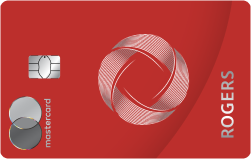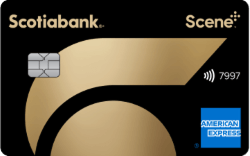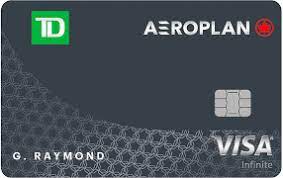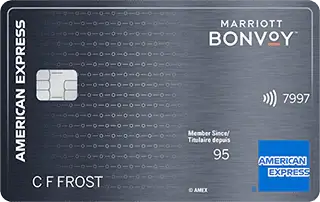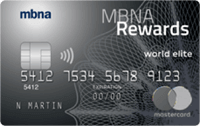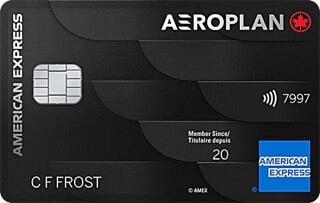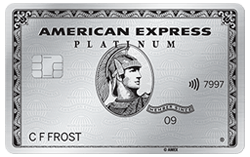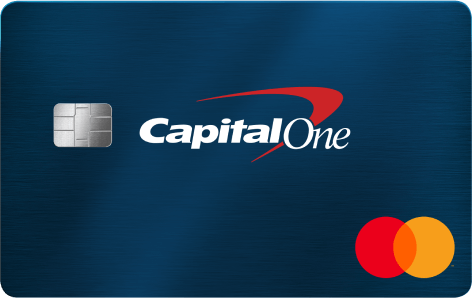With the right rewards credit card, you can earn points to put towards cash back, travel, financial products, merchandise, gift cards, and even charitable donations. The key to finding the best rewards card is to select one that matches your spending habits and your reward goals.
Below, we highlight our favourite cash back, travel, airline, and hotel rewards cards to help you get a jump start on finding the best-fitting card for you.
The best rewards credit cards in Canada
We’ve selected top cards across the cash back and travel rewards categories:

CIBC Dividend Visa Infinite Card

Scotiabank Gold American Express Card

TD Aeroplan Visa Infinite Card
Best for cash back rewards: Rogers Red World Elite Mastercard
There’s a lot of love for the Rogers Red World Elite Mastercard. With no annual fee, this cashback credit card offers 1.5% cash back on all purchases—that’s a major reward win. And in addition to a bonus for Rogers, Fido, and Shaw customers, this card comes with 3% cash back on transactions in U.S. dollars, effectively eliminating the standard 2.5% foreign transaction fee.
Rogers Red World Elite Mastercard
Annual fee: $0
- 3% cash back on all U.S. dollar purchases
- 1.5% on all other purchases (2% for Rogers, Fido and Shaw customers)
Welcome offer: None at this time.
Card details
| Interest rates | 25.99% on purchases, 27.99% on cash advances, 27.99% on balance transfers |
| Income required | $80,000 per year |
| Credit score | 725 or higher |
Pros
- Simple rewards structure: With the minimum earn rate of 1.5% cash back on all purchases, you don’t have to think about maximizing bonus categories or rewards tiers. The base earn rate is higher than any other no-fee card in Canada.
- Offset forex fees on U.S. purchases: 3% cash back on purchases made in U.S. dollars, both in-person and online, which is enough to offset the typical 2.5% foreign transaction fee.
- Rogers customer bonus: Rogers, Fido, and Shaw customers earn an additional 0.5% on all purchases (for a total of 2%). Plus, get a 1.5x redemption bonus when applying back rewards to bill payments with one of the three companies.
- Flexible redemptions: Cash out your rewards once you’ve accumulated a minimum of $10 cash back.
- No annual fee: Most comparable cards charge an annual fee of $120, which offsets some of the cash back you earn each year. This is a unique no-fee World Elite Mastercard.
- Broad acceptance: You can use this card at most stores in Canada, including all the major grocers and even at Costco (in fact, it’s an excellent Costco card).
Cons
- Flat earn rate: Other cards offer higher earn rates on select categories, which could help you reap more rewards, depending on your spending habits.
- High income requirements: You’ll need a personal income of at least $80,000 personal or $150,000 in annual household income to qualify.
Best for travel rewards: Scotiabank Gold American Express
The Scotiabank Gold American Express card is our pick for the best travel credit card in Canada thanks to its competitive earn rates, comprehensive travel insurance package, and other valuable perks, like no foreign transaction fees. It offers one of the highest rates of return on everyday spending, too.
Scotiabank Gold American Express
Annual fee: $120
- 6 points per $1 at Sobeys-affiliated stores
- 5 points per $1 on dining, entertainment and groceries
- 3 points per $1 on gas, transit and streaming
- 1 point per $1 on everything else
- Pay no FX fees on foreign purchases
Welcome offer: Earn up to $850 in welcome offers, first-year rewards and savings value, and up to 45,000 bonus Scene+ points. Offer ends July 1, 2026.
Card details
| Interest rates | 20.99% on purchases, 22.99% on cash advances, 22.99% on balance transfers |
| Income required | $12,000 per year |
| Credit score | 725 or higher |
| Point value | 1 Scene+ point = $0.01 when redeemed for travel, store purchases and food and drink at Cineplex and Scene partners |
Pros
- High earn rate: Earn up to 6 points per $1 on groceries and 5 points per $1 on dining, food delivery, and entertainment spending. This is among the best reward rates for these categories in Canada. You’ll also earn 3 points per $1 on gas and transit purchases.
- Redemption window: Through the “apply points to travel” option, you can redeem your points retroactively for up to 12 months after you make a travel purchase.
- Comprehensive insurance benefits: The card offers robust travel insurance coverage, including $1 million in medical travel insurance for up to 25 days—one of the longest coverage periods available.
- No foreign transaction fees: Enjoy savings on foreign currency transactions while travelling or shopping online, as this card waives the usual 2.5% foreign transaction fee.
Cons
- Fixed point redemption value: While the earn rates are high with this card, its points are always valued at $0.01 and cannot be transferred to airline frequent flyer programs, unlike some other travel cards.
- No free lounge passes: This credit card doesn’t include free airport lounge access but offers discount on Priority Pass memberships with discounted lounge access.
- Limited acceptance: American Express is not as widely accepted in Canada as Visa and Mastercard, and you can’t use it at Costco and Loblaw-owned stores.
Best for airline rewards: TD Aeroplan Visa Infinite
If you’re looking for a high-earning rate Aeroplan card with simple redemptions, take note of our pick for best airline credit card. The TD Aeroplan Visa Infinite card comes with perks like the $100 NEXUS fee rebate and free checked bags for you and up to eight travelling companions.
TD Aeroplan Visa Infinite Card
Annual fee: $139 (waived first year)
- 1.5 Aeroplan points per $1 on gas, EV charging, groceries and purchases
- 1.5 Aeroplan points per $1 on purchases made directly through Air Canada (including vacation packages)
- 1 point per $1 on all other purchases
Welcome offer: Up to $1,350 in value including up to 40,000 Aeroplan points could be yours. Plus, receive an annual fee rebate for the first year and additional travel benefits. Conditions apply.
Card details
| Interest rates | 21.99% on purchases, 22.99% on cash advances (21.99% in Quebec), 22.99% on balance transfers (21.99% in Quebec) |
| Income required | Personal income of $60,000 or household income of $100,000 |
| Credit score | 680 or higher (recommended) |
| Point value | Aeroplan points are worth $0.02 on average |
Pros
- Flexible redemptions: Use Aeroplan points when booking Air Canada seats without restrictions or blackout periods. Plus, redeem points for flights with other airlines in the Star Alliance program, including United Airlines and Lufthansa.
- NEXUS fee rebate: Get a $100 rebate on your Nexus customs travel application every 48 months.
- Competitive insurance package: Includes emergency medical travel coverage for 21 days, or 4 days for those 65 and older.
- Double Aeroplan points: Get double the Aeroplan points when using this card alongside your Aeroplan card at participating retailers, such as Best Buy, LCBO, and many, many more.
Cons
- Complex loyalty program: Aeroplan is a dynamic chart-based program, meaning point values fluctuate based on where and when you’re flying. If you want simple point redemptions, this may not be the program for you.
- Relatively high annual fee: This card has a slightly higher annual fee compared to other cards in this category, although the fee is waived for the first year.
Best for hotel rewards: Marriott Bonvoy American Express
With the ability to redeem for everything from room upgrades to spa treatments, Marriott Bonvoy points are valuable for frequent Canadian travellers. Plus, they’re transferrable to more than 35 airline frequent flyer programs. Extras like free hotel stays and Amex benefits make this a must-pack travel credit card for your next trip.
Marriott Bonvoy American Express
Annual fee: $120
- 5 points per $1 at Marriott properties
- 2 points per $1 everywhere else
Welcome offer: Earn up to 110,000 bonus Marriott Bonvoy points. Earn 80,000 points after you spend $6,000 on your Card in your first 6 months of card membership. Plus, earn 30,000 points when you make a purchase in your 15th month of card membership. Offer ends April 7, 2026.
Card details
| Interest rates | 21.99% on purchases, 21.99% on cash advances, penalty APR on purchases and cash advances (rates are variable) |
| Income required | None specified |
| Credit score | 725 or higher |
| Points value | 1 Marriott Bonvoy point is worth $0.0117 on average |
Pros
- Redemption options: Put points toward upgrades at a variety of hotels (St. Regis, The Ritz-Carlton, Westin and others), merchandise, and travel experiences. You can also use them for other travel expenses, like car rentals and flights.
- Annual free night: Free accommodation in a Marriott Bonvoy hotel every year, up to a maximum value of 35,000 points.
- Silver Elite status: Complimentary Marriott Bonvoy Silver Elite status, which can get you exclusive discounted rates and higher points earn rates when you book.
- American Express perks: Early access to event tickets through the Amex Front of the Line program, and take advantage of curated dining, retail and wellness experiences.
Cons
- Dynamic loyalty program: You’ll need to strategize, plan, and pay attention to the dates and times of your bookings if you want to get the most value out of your points.
- Limited acceptance: Amex is less widely accepted than Mastercards and Visas, and you can’t use them at Costco or Loblaws stores.
- Travel insurance limitations: This card does not come with travel emergency medical insurance.
To select the cards, we evaluated several key factors that are important when using a rewards credit card. First, we considered the rate of return on spending for popular categories and weighed that against any annual fee. We also looked at perks and benefits that could add value to the cards. The addition of links from affiliate partners has no bearing on the results in this ranking. Read more about MoneySense’s best credit cards selection process and about how MoneySense makes money.
Other top rewards credit cards in Canada
MBNA Rewards World Elite Mastercard
Cardholders who don’t mind redeeming points for travel through MBNA’s Rewards platform will probably want to reach for this World Elite Mastercard. The card earns you 5 points per $1 spent on restaurant, grocery, digital media, membership, and household utility purchases. Plus, as a World Elite Mastercard, you’ll get benefits like Travel Pass lounge access (no free passes), concierge service, and exclusive access to hotels and experiences.
MBNA Rewards World Elite Mastercard
Annual fee: $120
- 5 points per $1 on eligible restaurant, grocery, digital media, membership and household utility purchases until $50,000 is spent annually in the applicable category
- 1 point for every $1 on all other eligible purchases
Welcome offer: earn 20,000 bonus points (approximately $165 in cash back value) after you make $2,000 or more in eligible purchases within the first 90 days. (Not available for residents of Quebec.)
Card details
| Interest rates | 21.99% on eligible purchases, 22.99% on balance transfers and 22.99% on cash advances. |
| Income required | $80,000 per year |
| Credit score | 660 or higher |
| Point value | 1 MBNA Rewards point = $0.01 when redeemed for travel |
Pros:
- Easy redemptions: You don’t have to worry about complex rewards charts. It’s simple to understand and use.
- High earn rates: One the highest rates of return in Canada, this Mastercard earns a whopping 5 points per $1 spent across five spending categories (up to $50,000 in spending).
- Annual birthday bonus: Every year, enjoy a bonus equal to 10% of the points earned within the last 12 months (up to a maximum of 15,000 points).
Cons:
- Limited travel redemption: Points can only be redeemed for travel through the MBNA Rewards platform.
- High income requirements: As with most other World Elite Mastercards, the minimum annual income needed to qualify is quite high at $80,000 personal or $150,000 household per year.
American Express Aeroplan Reserve Card
Designed for Air Canada loyalists, this premium card unlocks elite travel benefits like complimentary Maple Leaf Lounge access, airport benefits, companion passes, and a Nexus fee rebate every four years. Plus, earn 3 points on Air Canada purchases, 2 points on dining and food delivery, and 1.25 points on everything else.
American Express Aeroplan Reserve
Annual fee: $599
- 3 points per $1 on Air Canada purchases
- 2 points per $1 on dining and food delivery
- 1.25 points per $1 on everything else
Welcome offer: Earn up to 85,000 Aeroplan points. Earn 60,000 points after you spend $7,500 in your first 3 months of card membership. Plus, earn an additional 25,000 points after you spend $2,500 on your card in month 13.
Card details
| Interest rates | 21.99% on purchases and 21.99% on cash advances, penalty APR on purchases and cash advances (rates are variable) |
| Income required | None specified |
| Credit score | 725 or higher |
| Point value | Aeroplan points are worth $0.02 on average |
Pros:
- Solid earn rate: Earn up to 3 points per $1 spent, with the highest earn rate reserved for Air Canada purchases.
- Air Canada benefits: Priority check-in, boarding, and baggage handling on Air Canada flights, plus free first checked bags for cardholder and up to 8 people on the same reservation.
- Comprehensive insurance coverage: Emergency medical, trip cancellation/interruption, flight delay, and car rental insurance is standard with this card.
- Flexible redemptions: Redeem points for Air Canada flights, Star Alliance partners, and vacation packages, or transfer them to other partner loyalty programs.
- Reach Aeroplan Elite Status faster: Get 1,000 Status Qualifying Credits (SQC) for every $20,000 in eligible net purchases charged to your Card, up to 25,000 SQC.
Cons: - High annual fee: The card charges $599 per year, which takes a bite out of the rewards you earn.
- No mobile device coverage: This basic insurance type is usually included, so it’s surprising that this premium card doesn’t offer it.
American Express Platinum
The Amex Platinum is the most premium credit card on our list, standing out for its perks and benefits. You’ll be treated to an annual $200 dining credit, $200 travel credit, generous insurance package, and access to 1,400 airport lounges around the world.
American Express Platinum
Annual fee: $799
- 2 points per $1 on dining and food delivery
- 2 points per $1 on travel, plus 1 additional point on purchases booked through Amex Travel Online
- 1 point per $1 on everything else
Welcome offer: Earn up to 100,000 Membership Rewards points ($1,000 value). New Platinum card members, earn 70,000 points after you charge $10,000 in net purchases to your card in your first 3 months of card membership. Plus, earn 30,000 points when you make a purchase between 15 and 17 months of card membership.
Card details
| Interest rates | N/A (as a charge card, you’re required to pay off your balance in full every month) |
| Income required | None |
| Credit score | 760 or higher |
| Anniversary bonus | $200 annual dining credit to use at a curated list of Canada’s top restaurants. Plus, $200 annual travel credit when booking through American Express Travel Online. |
| Point value | 1 Amex Membership Rewards point = $0.01 when redeemed with the Flexible Points Travel Program, $0.015 on average with the Fixed Points Travel Program, and up to $0.02 with airline points transfers |
Pros:
- Steady earn rate: While not as high as some of the cards on our list, you’ll enjoy 2 points per $1 spent on restaurants and travel (and 1 point per $1 everywhere else).
- Comprehensive insurance package: You’ll get standard purchase protection along with travel insurance like emergency medical, hotel burglary, travel accident, trip insurance, and more.
- Ability to transfer points: Unlike many rewards cards, you can transfer your points to a different rewards program, airline partner, or hotel partner. This puts you in control of redeeming your points for travel.
Cons:
- Steep annual fee: The card’s $799 annual fee is considerably more expensive than other cards on our list.
- Lower acceptance: American Express doesn’t enjoy the same universal acceptance as Visa and Mastercard, and it’s not accepted at Costco and Loblaws.
Capital One Smart Rewards Mastercard
The Capital One Smart Rewards Mastercard flips the typical rewards model on its head. Instead of earning points when you spend, you earn 5 points for every dollar you pay toward your balance, rewarding consistent, responsible payment habits rather than purchases. It’s a smart option for those focused on building credit and maintaining good financial habits.
Capital One Smart Rewards Mastercard
Annual fee: $0
Rewards: Earn 5 points per $1 paid towards your balance.
Welcome offer: None at this time.
Card details
| Interest rates | 21.9% – 29.9% on purchases, balance transfers and cash advances |
| Income required | None |
| Credit score | None |
Pros:
- Rewards responsible credit use: Earns 5 points for every dollar you pay toward your balance.
- No annual fee: Makes it easy to keep and use long-term without ongoing costs.
- Supports credit building: Consistent on-time payments can help improve your credit score.
Cons:
- No rewards on spending: You won’t earn points for purchases, only for payments.
- Limited redemption options: Fewer ways to use your points compared to traditional rewards programs.
- Few extra perks: Lacks travel or purchase insurance and other premium benefits found on higher-tier cards.
Compare all rewards credit cards
Why trust us
MoneySense is an award-winning magazine, helping Canadians navigate money matters since 1999. Our editorial team of trained journalists works closely with leading personal finance experts in Canada. To help you find the best financial products, we compare the offerings of major institutions, including banks, credit unions and card issuers. Learn more about our advertising and trusted partners.
How much are rewards points worth?
With consistent rewards programs, the points are worth a fixed amount and this doesn’t change. Here are the values of points with consistent rewards programs in Canada.
| Rewards program | Value range | Highest-value redemption | Other redemption options |
|---|---|---|---|
| MBNA Rewards | $0.005 – $0.01 | Travel purchases | Merchandise, gift cards, cash back, charitable donations |
| Scene+ Points | Up to $0.01 | Travel, purchases at affiliated grocery, liquor and drug stores, and food and drink at Cineplex and Scene partners | Movie tickets, gift cards, merchandise, statement credits |
| American Express Membership Rewards points | $0.007 – $0.07 | Statement credit | Travel, transfer to other rewards programs, gift cards, merchandise |
| TD Rewards | $0.04 – $0.05 | Travel rewards booked via Expedia For TD | Merchandise, statement credits, gift cards, travel through other websites |
| BMO Rewards | $0.005 – $0.0067 | Travel | Merchandise, gift cards, transfer to other travel programs, BMO investments |
| PC Optimum | $0.075 – $0.015 | Car wash at Esso and Mobil gas stations. | Loblaw-banner grocery stores, Shoppers Drug Mart |
| Aeroplan | x | Flights on Air Canada | Travel (car rentals, hotels, vacation packages), merchandise, gift cards |
| RBC Avion Rewards | x | Avion Air Travel redemption | Transfer points to other travel programs, charity, merchandise, gift cards, RBC financial rewards, pay with points |
| CIBC Aventura | x | Aventura Travel | Shopping with points, charity, financial products, merchandise, gift cards, pay with points |
Pros and cons of rewards credit cards
Before applying for a credit card with high rewards, consider the following pros and cons of using rewards programs:
Pros
- Earn rewards on everyday purchases: Earn cash back or loyalty points that you can redeem for travel, merchandise, and gift cards. Many cards offer accelerated earnings on specific categories, such as groceries, dining, or travel, allowing you to strategically maximize your earnings.
- Valuable sign-up bonuses: Many rewards cards offer lucrative bonuses and earn rates for meeting initial spending thresholds. These rewards can be worth hundreds of dollars.
- Additional perks: Premium rewards cards often include perks, like travel insurance, airport lounge access, concierge services, and exclusive deals.
- Variety of redemption options: The better the reward program, the more options you have for redeeming your points. You might cash in points for travel, cash back, merchandise, charitable donations, or financial products.
Cons
- Annual fees: Many rewards cards charge modest to significant annual fees, reducing the overall value for low spenders.
- Higher interest rates: Rewards cards often have higher annual percentage rates (APRs), making them less valuable for those who carry a balance.
- Complex redemption rules: When redeeming for travel purchase, you might encounter blackout dates, restrictions, or fluctuating point values, making it harder to redeem your points at peak value.
- Temptation to overspend: If you’re not disciplined, the idea of earning rewards might encourage you to spend beyond your means.
How to choose a rewards card
If you’re shopping around for a new rewards credit card, you may notice most boil down to two types: points or cash back. It might be tempting to pick the card that gives you the best return, but it’s not always that simple to find the best credit card for the best rewards in Canada.
First, consider your own spending habits and budget. Think about where you spend most of your money in a given month so you can find a card that offers high rewards for that category. Then, to narrow down your options, decide if you’d rather get cash back or points that you can redeem in a number of ways.
The case for cash back rewards
If you prefer simplicity, cash-back cards are the way to go. The best cash back credit cards give you the highest return based on your everyday spending habits. They may even rank as the highest rewards credit cards in Canada. Here’s what to consider:
- Payouts: Depending on the credit card, cash back may be paid out monthly, quarterly or annually and refunded in the form of a statement credit, direct deposit to your bank account or a cheque in the mail.
- Percentage earned: Cash back credit cards offer a fixed percentage on rewards based on how much you spend. Generally speaking, cash back cards with an annual fee will earn you a higher base percentage, so you need to factor that in if you’re comparing them to a no-fee credit card.
- Multipliers: Some cash back cards offer multipliers, meaning you get a higher percentage of cash back in certain spending categories, such as grocery stores, gas stations, drugstores and automated payments for recurring bills.
The case for points
Instead of earning cash, travel rewards credit cards net points that can be used to claim travel (flights, hotels), gift cards, or merchandise. Rewards cards can be quite lucrative when you know how to earn and redeem points effectively, but there are several features to consider.
- Type of rewards earned: Rewards credit cards are either linked to a specific brand (like a travel airline or hotel) or they give you flexibility to travel on any carrier. If you’re loyal to a specific retailer, it makes sense to pick a co-branded card. If you prefer flexibility, then pick a card that gives you the most options.
- Sign-up bonus: Most rewards cards offer a huge signup or welcome bonus to entice Canadians to apply. Assuming you can meet the minimum spending requirements, that bonus could be worth a few hundred dollars (which could offset the first year’s annual fee).
- Ease of redemption: Rewards are useless if you don’t use them. Look for loyalty programs without blackout dates. Another no-deal: too many restrictions. Be sure you can redeem your points whenever it’s convenient for you.
- Value of points: Know what your rewards (specifically points or branded dollars) are actually worth. For example, if you earn 1 point for every $1 spent, and it takes 100 points for you to claim $1 in rewards, your points are worth 1%. If you have a co-branded flight or hotel credit card, determine how many points it takes to get your free seats or hotel stays.
- Additional benefits: Many rewards cards offer the following standard benefits: comprehensive travel insurance package, auto rental insurance and price protection. More premium cards also include benefits like roadside assistance or personalized discounts.
Featured credit cards

Scotiabank Passport™ Visa Infinite Card

SimplyCash Preferred Card from American Express

MBNA True Line Mastercard credit card
FAQs
The best rewards credit card depends on how you want to get your rewards. The Rogers Red World Elite Mastercard is the best for cash back while the Scotia Gold Amex is best for travel rewards.
Since rewards programs vary so widely in terms of what you earn and how you redeem points, we’re going to say the best program is whichever one you’ll use the most.
Rewards credit cards can be worth it if you don’t spend beyond your means and you’re using a card that reflects your shopping habits. This way, you’ll earn rewards at a faster rate (and be able to redeem them more often).
If you’ve got bad credit, you might find it harder to qualify for a rewards credit card. Instead, try applying for a credit card for poor credit and work on improving your score. Then, you may be able to get a rewards card.
